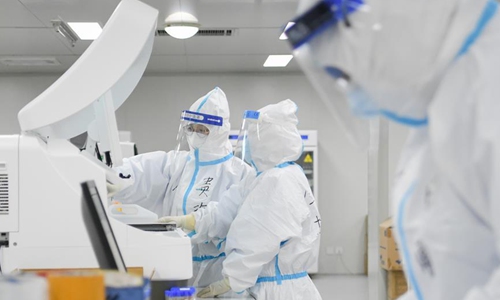Beijing to build P3 laboratory
Source:Globaltimes.cn Published: 2020/5/18 0:13:48

Gui Haiyan (1st L) from Guangzhou KingMed Diagnostics Group Co., Ltd. conducts detections at the clinical laboratory of the Leishenshan (Thunder God Mountain) Hospital in Wuhan, central China's Hubei Province, March 4, 2020. Photo: Xinhua
Beijing will increase construction efforts on its P3 laboratory to improve and explore infectious disease detection capacity, Lei Haichao, director of Beijing Municipal Health Commission, said at a press conference on Sunday, Chinanews reported.
There is no P3 laboratory in Beijing now. When COVID-19 emerged, the nation's capital had 17 facilities equipped with nucleic acid testing capabilities. Within two months, 70 institutions had added testing capabilities necessary to conduct 51,000 tests daily, Lei said.
Recently, the highest number of tests completed in one day is 30,000, indicating ample reserve capacity. However, the ability of Beijing laboratories to target infectious diseases needs to be explored and improved in the long term, according to Lei.
Posted in: SOCIETY